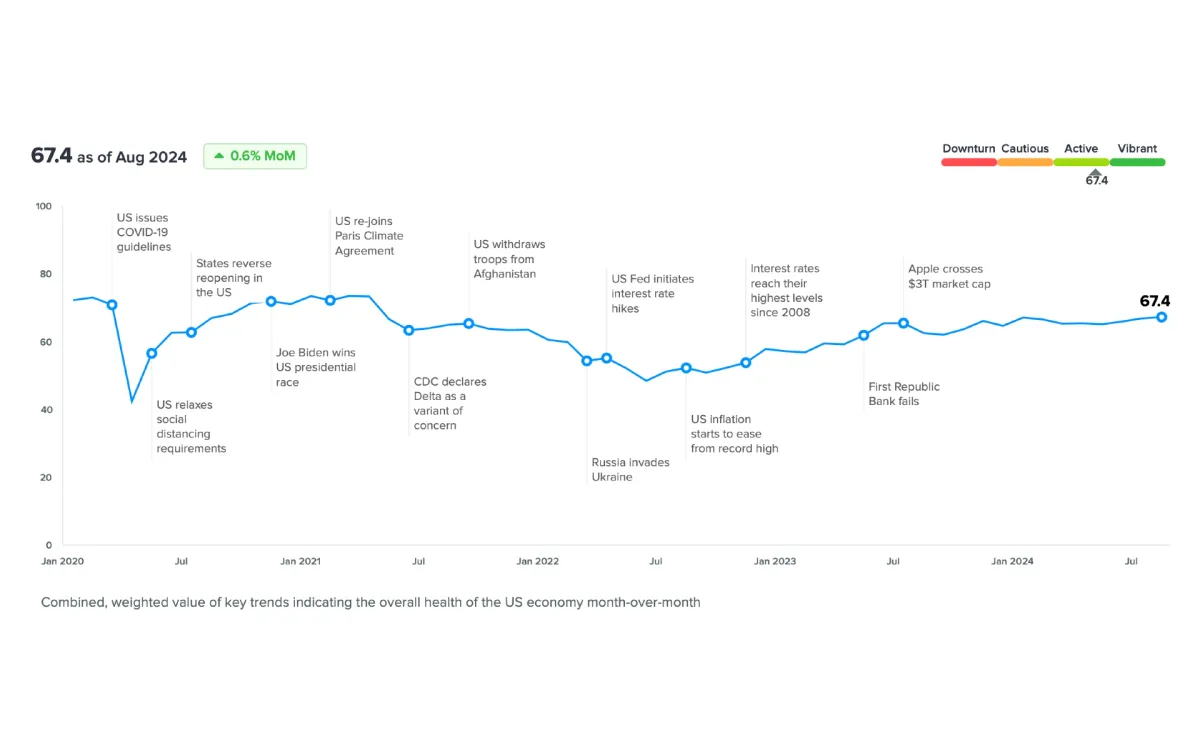
Zeta Global this week released its Zeta Economic Index (ZEI) for August 2024, shedding light on the current state and trajectory of the US economy. The report, published yesterday, utilizes advanced AI technology to analyze consumer behavior data from over 240 million US consumers, providing a comprehensive view of economic trends and consumer sentiment.
According to Zeta Global, the ZEI's two primary measures - the Economic Index Score and Economic Stability Index - both exhibited incremental gains for August. The Economic Index Score increased by 0.6 points from July to reach 67.4, categorized as "Active," which indicates robust economic activity with healthy growth across various sectors. This growth represents an acceleration from July's month-over-month increase of 0.3 points. Simultaneously, the Economic Stability Index rose by 0.3 points from the previous quarter to 66.1, defined as "Stable," suggesting that individuals generally have steady incomes allowing them to manage short-term financial disruptions with relative ease.
David A. Steinberg, Co-Founder, Chairman, and CEO of Zeta Global, emphasized the resilience of US consumers in the face of economic headwinds. He noted that the latest data reflects modest but steady growth, underscoring consumers' adaptability as they navigate a challenging job market and ongoing uncertainties.
The ZEI report highlights a notable bifurcation in consumer spending patterns. Discretionary spending has surged, showing a remarkable 15% year-over-year increase. This uptick is partially attributed to back-to-school shopping but also suggests that many consumers remain willing to indulge in non-essential purchases despite ongoing economic uncertainties. In stark contrast, the New Mover Index, which tracks cohort activity related to relocations, has declined by 10% month-over-month, reflecting growing caution among consumers.
Job market sentiment, a crucial indicator of economic health, shows signs of increasing uncertainty. The Job Market Sentiment Index has dipped 4.6% compared to the same period last year, underscoring a growing sense of unease among workers as economic conditions continue to evolve. This decline in job market confidence could potentially impact consumer spending and economic growth in the coming months.
The automotive sector emerges as a bright spot in the August ZEI report. The Automotive Index has climbed by 4.1 points since July, driven in part by aggressive dealer incentives aimed at clearing excess inventory ahead of the new model season. This surge in automotive interest could indicate a potential boost in consumer durables spending, which often serves as a leading indicator of broader economic trends.
However, not all sectors are experiencing growth. The retail sector faces significant challenges, with the Retail Index dropping 12.6 points month-over-month. This decline is attributed to an early end to the back-to-school shopping season, suggesting that consumers may be front-loading their purchases or becoming more selective in their spending habits.
The travel sector, as expected, is experiencing a slowdown as summer vacations wind down. Despite this seasonal dip, the travel index is still tracking above 2023 values by 7.5 points, indicating a continued recovery in the tourism and hospitality industries post-pandemic.
One of the most intriguing aspects of the ZEI is its utilization of generative AI to analyze trillions of behavioral signals. This approach provides comprehensive scores that reflect economic sentiment, trends, and dynamics. Unlike traditional surveys, the ZEI employs over 20 proprietary inputs that recalibrate each month based on actual consumer behavior. This methodology enhances the understanding of consumer activity, a key driver of economic growth.
The ZEI's AI-powered approach allows for a more nuanced and real-time analysis of economic conditions. By processing vast amounts of data on consumer behavior, the index can potentially identify emerging trends before they become apparent in traditional economic indicators. This predictive capability could prove invaluable for businesses and policymakers seeking to anticipate and respond to economic shifts.
It's important to note that while the ZEI provides valuable insights, Zeta Global emphasizes that it should not be considered investment advice or relied upon to make investment decisions. The index is provided as a complimentary service to offer a broader understanding of economic trends.
The August 2024 ZEI report paints a picture of a US economy that remains resilient despite facing numerous challenges. The modest growth in both the Economic Index Score and Economic Stability Index suggests that consumers are adapting to the current economic environment, balancing their desire for discretionary spending with a growing sense of caution.
The divergence in consumer behavior, with increased discretionary spending alongside declining relocation activity, highlights the complex nature of the current economic landscape. This bifurcation may indicate that while some consumers feel confident enough to increase their non-essential purchases, others are adopting a more conservative approach, possibly in response to job market uncertainties.
The automotive sector's strong performance, juxtaposed with the challenges faced by the retail sector, further illustrates the uneven nature of the economic recovery. These sector-specific trends may provide valuable insights for businesses and investors looking to navigate the current economic climate.
As the US economy continues to navigate post-pandemic recovery, inflationary pressures, and geopolitical uncertainties, tools like the Zeta Economic Index offer a data-driven approach to understanding consumer behavior and economic trends. By leveraging AI and real-time data, the ZEI provides a unique perspective on the health and direction of the US economy.
Key facts from the August 2024 Zeta Economic Index
- Economic Index Score increased by 0.6 to 67.4, categorized as "Active"
- Economic Stability Index rose by 0.3 to 66.1, defined as "Stable"
- Discretionary spending showed a 15% year-over-year increase
- New Mover Index declined by 10% month-over-month
- Job Market Sentiment Index dipped 4.6% compared to the previous year
- Automotive Index climbed by 4.1 points since July
- Retail Index dropped 12.6 points month-over-month
- Travel sector is tracking 7.5 points above 2023 values
- The ZEI utilizes over 20 proprietary inputs and analyzes data from 240 million US consumers
- The index is powered by Zeta's proprietary Generative AI technology

